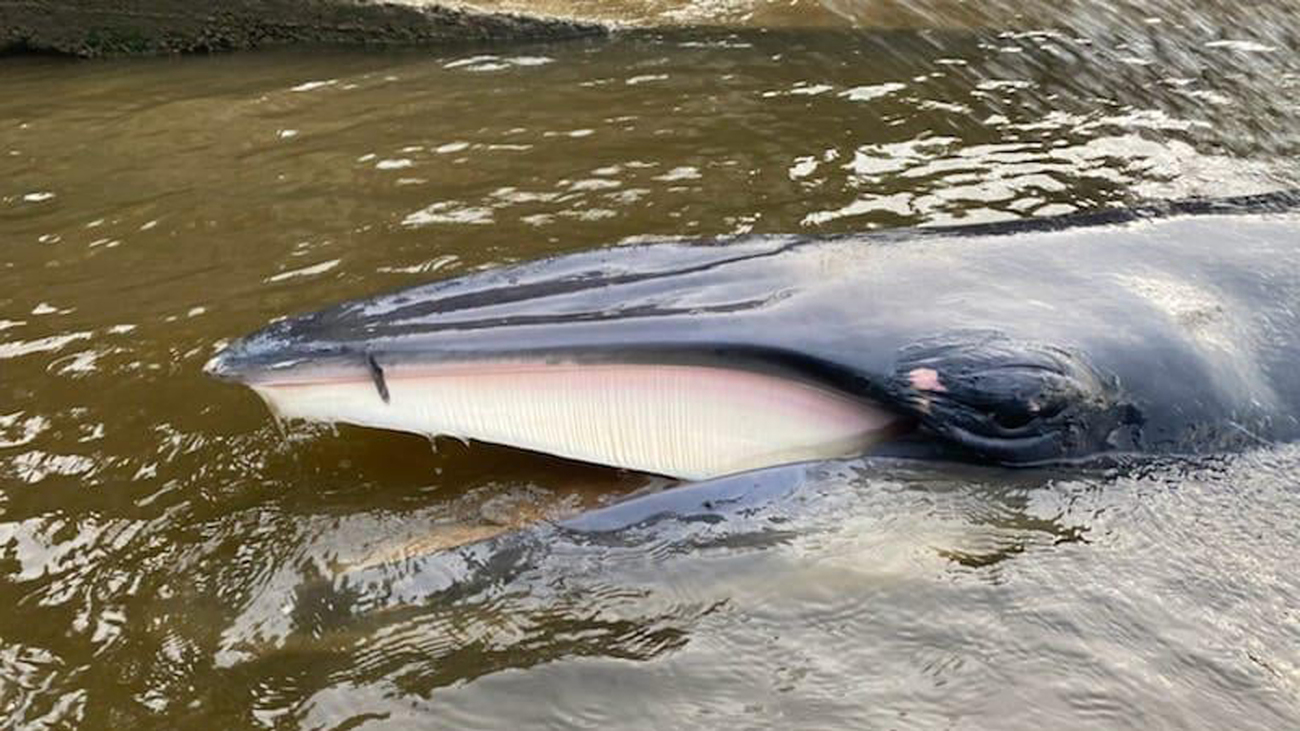Stranded Marine Mammal Rescue - Global
When the tide is low, the stakes are high for marine mammalsthe Thames minke whale: what can we learn from this tragedy?
the Thames minke whale: what can we learn from this tragedy?

It's Tuesday morning and I’m totally devastated by the news that the minke whale calf that was trapped in the River Thames in recent days had to be euthanised to prevent further suffering.
How did we go from Sunday, when so many Londoners were revelling at the sight of such a majestic animal being seen in the capital, to its untimely death just over 24 hours later? You could see the sudden change in the public’s reaction when they realised that they weren’t watching a playful jaunt up the Thames but a tragedy unfolding.
Ask anyone who has been whale watching and you will hear of that moment of wonder at witnessing one of these mysterious marine creatures in its natural environment. In instances like this, there is a poignancy that a whale will still attract crowds of people desperate to catch a glimpse of it—demonstrating the deep emotional connection between people and animals—even though those of us who work to protect whales know that usually, such events do not have a happy outcome.
The fact is that no matter how much we might like seeing such animals on our doorsteps, it was never right that this species should have ended up along the Thames, many miles away from its natural habitat out at sea. It’s of course amazing to watch marine animals in the UK, but there are plenty of places where we can witness them in their own habitat and safely for them and us. From bottlenose dolphins in Cardigan Bay, Wales, to orcas in Orkney, basking sharks off the Isle of Man and grey seals around the Farne Islands.
Minke whales are the smallest of the great whales, although as they grow to around 10 metres long I still struggle to consider that ‘small’! They are found throughout the world’s ocean (except the Arctic), and we are lucky to have frequent sightings off our UK coasts, especially around Scotland. It’s more unusual to find them so far south, where they have clearly gone off course.
Human activities contributing to whale strandings
It is difficult to know precisely why this whale went so off track and so far along the Thames. Over the years, a number of whales have been sighted in the Thames and all have unfortunately died. In 2019 a humpback whale was sighted there, but died following a collision with a boat, known as a ‘ship strike’, and in 2006 a huge rescue operation took place to try to save a northern bottlenose whale discovered swimming in the Thames in central London, sparking a global media frenzy. This species is usually found in very deep, offshore waters and unfortunately also ended with the weak and starving whale needing to be euthanised. Affectionately named Willy the Whale by the public despite being female, her remains are currently on display at the Natural History Museum.
The Thames minke whale was in poor condition and a post-mortem examination might be able to tell us more—perhaps if it had been injured somehow, through coming into contact with fishing gear or due to ‘ship strike’ in addition to any injuries from stranding. As the calf had been separated from its mother, it may have somehow become disorientated, perhaps following prey, having gone off track and being unable to find its way back.
However, we must consider the role that human activity may have played. Of course, it’s difficult to prove in one specific case, but we do know that loud underwater noise can confuse and disorientate marine mammals. Around our seas, we also have significant shipping lanes that generate large amounts of underwater noise, which can negatively impact the ability of whales to communicate with one another, navigate and find prey. Loud noise is also emitted from seismic surveys exploring for oil or gas, and from sonar from military exercises.
Protecting whales and marine life in the UK—the way forward
Marine mammals, like whales and dolphins, live in an acoustic world and all of this ocean noise from human activities can interrupt essential behaviours such as feeding, socialising and breeding. This isn’t a blame game, but a time to understand the impact we have on our beautiful coastal waters and the animals that live there. We need to understand that ships moving around our coasts in huge numbers can cause problems. We need shipping companies, ferries, ports, ship designers and manufacturers to come together to find creative and sustainable solutions to this problem. At IFAW we have been working on this problem for many years around the world and right here in the UK, we’d welcome any group that would like to talk to us about plotting forward a safe journey for our marine life.
There’s also so much that we as individuals can do too. Take a look at our blog which lists out 15 ways you can help protect the ocean and marine animals.
We need a commitment to do all we can to protect these animals, or we may find a time when either we don’t get to see species in their natural habitat as much as we did, or the opposite: tragic whale deaths like this could happen much more regularly.
I for one hope this death provides the wake-up call we desperately need.
- Joshua Kaile, IFAW Head of Programmes & Policy, UK
Related content
Every problem has a solution, every solution needs support.
The problems we face are urgent, complicated and resistant to change. Real solutions demand creativity, hard work and involvement from people like you.